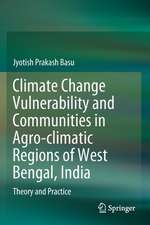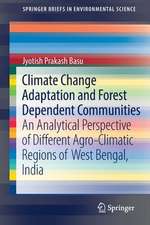Governance and Institution in the Indian Forest Sector: An Analytical Study
Autor Jyotish Prakash Basuen Limba Engleză Paperback – 12 iul 2024
| Toate formatele și edițiile | Preț | Express |
|---|---|---|
| Paperback (1) | 727.24 lei 38-44 zile | |
| Springer Nature Switzerland – 12 iul 2024 | 727.24 lei 38-44 zile | |
| Hardback (1) | 894.37 lei 6-8 săpt. | |
| Springer Nature Switzerland – 11 iul 2023 | 894.37 lei 6-8 săpt. |
Preț: 727.24 lei
Preț vechi: 956.90 lei
-24% Nou
Puncte Express: 1091
Preț estimativ în valută:
139.17€ • 144.47$ • 116.05£
139.17€ • 144.47$ • 116.05£
Carte tipărită la comandă
Livrare economică 18-24 martie
Preluare comenzi: 021 569.72.76
Specificații
ISBN-13: 9783031347481
ISBN-10: 303134748X
Ilustrații: XIV, 231 p. 48 illus., 43 illus. in color.
Dimensiuni: 155 x 235 mm
Ediția:2023
Editura: Springer Nature Switzerland
Colecția Springer
Locul publicării:Cham, Switzerland
ISBN-10: 303134748X
Ilustrații: XIV, 231 p. 48 illus., 43 illus. in color.
Dimensiuni: 155 x 235 mm
Ediția:2023
Editura: Springer Nature Switzerland
Colecția Springer
Locul publicării:Cham, Switzerland
Cuprins
Introduction.- Review of Literature.- Data Base and Methodology.- India’s Forest Cover, Forest policies and Acts and Impact of Governance on Forest Cover.- Institutions & Enforcement at Local Level.- Forest Dependency and Forest Governance in South Bengal and North Bengal Forest Divisions.- Conclusions and Policy Recommendations.
Notă biografică
Dr. Jyotish Prakash Basu is a Professor and former Vice Chancellor, West Bengal State University in Kolkata, India. His research focuses include agricultural economics, environmental economics and forest economics. He is currently researching the economic, social and environmental dimensions of climate change adaptation, ecosystem services, forest resource management, non-timber forest products, sustainable development and food security of forest dependent people.
Textul de pe ultima copertă
This book addresses quantitative assessment of forest governance and how local-level institutions work in governing efficient ways of forest resource management so that sustainable development of forest is ensured. The research is done at the micro-level as well as macro-level in India. The research presented here focuses on forest governance and institutions in the two forest divisions of West Bengal say South Bengal and North Bengal. The research covers 36 villages, 844 households, 10 Gram panchayat, 12 Beat offices, and 36 Forest protection Committees in West Bengal and also studies different local-level institutions like local communities/households; Joint Forest Management Committees (JFMC)/Forest Protection Committees (FPCs); Community Forest Management groups; Van Panchayats; Village Councils (schedule VI area) and Biodiversity Management Committees; Eco-development committees, NGOs and Self-Help Groups, and Panchayati Raj Institutions (PRIs). Chapters also address various issues like monitoring, enforcement, rule of law, transparency, accountability, participation, control of corruption, government effectiveness, regulatory quality, and sustainable livelihood in connection with the study of forest governance. This research is associated with different sectors like agricultural sector, forestry sector, informal sectors and rural development, etc., and involved multi-stakeholders. Particular attention is given on the policy-oriented research which is the cornerstone of SDG of 16. Developmental practitioners, government implementation agencies, researchers in environmental science and social science, and policymakers find this book appealing.
Caracteristici
Addresses quantitative assessment of forest governance Focuses on the policy-oriented research which is the cornerstone of SDG of 16 Highlights research carried out at the micro-level as well as macro-level in India














